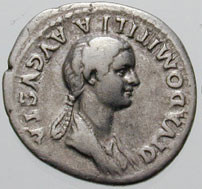Flavius Liberalis was a Roman of the 1st century and was a man of equestrian rank, who came from Ferentium (modern Ferento) a country town in Italy. This man of humble origins was a quaestor and later a law clerk.

In historiography, ancient Rome is Roman civilization from the founding of the Italian city of Rome in the 8th century BC to the collapse of the Western Roman Empire in the 5th century AD, encompassing the Roman Kingdom, Roman Republic and Roman Empire until the fall of the western empire. The civilization began as an Italic settlement in the Italian Peninsula, conventionally founded in 753 BC, that grew into the city of Rome and which subsequently gave its name to the empire over which it ruled and to the widespread civilisation the empire developed. The Roman empire expanded to become one of the largest empires in the ancient world, though still ruled from the city, with an estimated 50 to 90 million inhabitants and covering 5.0 million square kilometres at its height in AD 117.

Italy, officially the Italian Republic, is a country in Southern Europe. Located in the middle of the Mediterranean Sea, Italy shares open land borders with France, Switzerland, Austria, Slovenia and the enclaved microstates San Marino and Vatican City. Italy covers an area of 301,340 km2 (116,350 sq mi) and has a largely temperate seasonal and Mediterranean climate. With around 61 million inhabitants, it is the fourth-most populous EU member state and the most populous country in Southern Europe.

A quaestor was a public official in Ancient Rome. The position served different functions depending on the period. In the Roman Kingdom, quaestores parricidii were appointed by the king to investigate and handle murders. In the Roman Republic, quaestors were elected officials who supervised the state treasury and conducted audits. It was the lowest ranking position in the cursus honorum. However, this means that in the political environment of Rome, it was quite common for many aspiring politicians to take the position of quaestor as an early rung on the political ladder. In the Roman Empire, the position, which was initially replaced by the praefectus (prefect), reemerged during the late empire as quaestor intra Palatium, a position appointed by the emperor to lead the imperial council and respond to petitioners.
Liberalis had his daughter Flavia Domitilla appear before a board of arbitration to prove her claim for Roman Citizenship, instead of a Latin one. She later married the future Emperor Vespasian. Her children with Vespasian were Domitilla the Younger and Emperors Titus and Domitian.

Flavia Domitilla MajorFlavia Domitilla the Elder or Domitilla the Elder was the wife of the Roman Emperor Vespasian.

Vespasian was Roman emperor from 69–79, the fourth, and last, in the Year of the Four Emperors. He founded the Flavian dynasty that ruled the Empire for 27 years.

Flavia Domitilla the Younger or Flavia Domitilla Minor was the only daughter of the Roman Emperor Vespasian and Flavia Domitilla the Elder. Her elder brother was Titus, and her younger brother Domitian. At the age of fifteen, she was married to Quintus Petillius Cerialis, with whom she had a daughter, the later Christian saint Flavia Domitilla.







